#chinese culture in danmei
Text
Hey MDZS fandom. I want you guys to be careful interacting with this person.

If you don't already know, Chinese people have had a long history with cultural erasure when it comes to taking on English-language names. It started with imperialism, and continues as a way to "assimilate" and avoid mockery of our language in western countries.
For Chinese diaspora like myself, it's another form of racism we face, to the point where some of us are reclaiming our names in everyday life. Here's an article about this movement happening across Asian diasporas in the United States -- just to name one instance out of many.
The responses to this post reflect that:
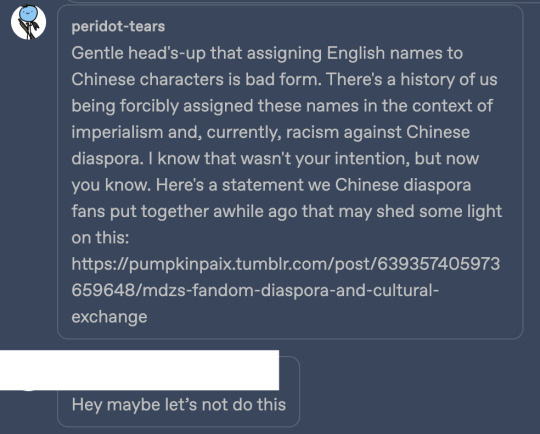
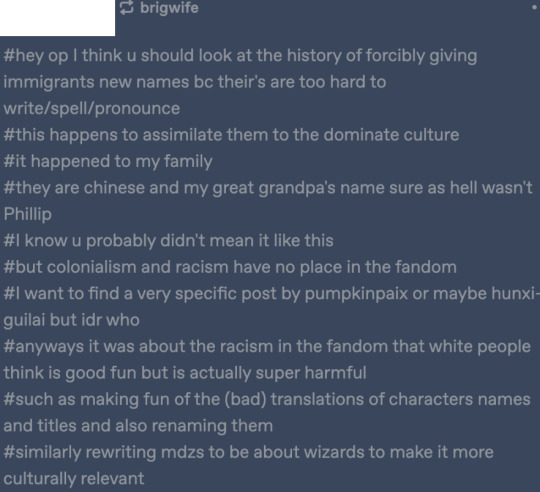
You can see that my comment assumed "good faith." However, OP deleted these comments and blocked me. (That didn't stop other people from calling it out as well, though I have to assume that if OP was so offended by my comment, the next few people will receive the same treatment.)
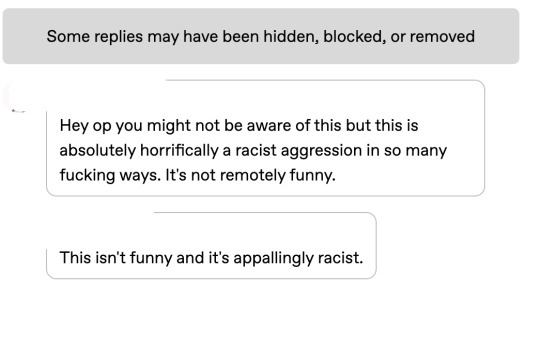
I honestly didn't like whipping up the diaspora statement -- that I wrote with multiple Chinese diaspora fans of MDZS, all of us hailing from multiple different countries and backgrounds, our ancestry coming from completely different regions of China -- because it meant that we were encountering another microaggression.
If you ever wonder why MDZS and danmei fandoms in general seem to be so bereft of Chinese diaspora voices, that's absolutely because of these microaggressions: Someone makes a joke, writes a story, writes some meta, that is culturally ignorant at best, offensive and harmful at worst, and when we gently correct them, explaining why it's racist, the person in question shuts us down, dismisses us, gets defensive, or worse.
Regardless of where you are -- fandom, social media, on the street, at work, at school -- as long as you are interacting with other people, your words matter and affect other people. That includes being racially offensive, even if you didn't intend to be. It's how you respond to the people you've insulted that reveals your character, how willing you are to be complicit in their mistreatment.
My rule of thumb has always been this -- if multiple people, including those of the culture you've just made a microaggressive joke about, find it unfunny, racist, or harmful, then you listen. Dismiss or ignore them, then yes -- you absolutely are racist.
#fandom racism#mdzs#mo dao zu shi#danmei#mxtx#wwx#mo xiang tong xiu#墨香铜臭#魔道祖师#魏无羡#耽美#asian drama#anti asian racism#chinese diaspora#tears falling like peridots#brigwife#cultural erasure#cql#chen qing ling#the untamed#陈情令
2K notes
·
View notes
Text
wuxia and confucianism
Hey. Thought I'd answer the wuxia-confucian question very briefly. I did suggest wuxia being closely knitted to confucianism, but I do understand the other perspective of wuxia being anti-confucian. Quick answer only because I've got little time right now -- might add on to it later!!

confucianism
First the central themes of confucianism:
常 (cháng): Virtues of compassion and courtesy. 仁 (rén)、义 (yì)、礼 (lǐ)、智 (zhì)、信 (xìn)、忠 (zhōng)、孝 (xiào)、悌 (tì) (there are more). These in order in crude translation mean compassion, righteousness, courtesy, wisdom, integrity, loyalty, filial piety, and respect to one's older siblings. These are the main ideas Confucius, the founder of Confucianism, wished to spread through his philosophy.
纲 (gāng): Order. This is about the relationships between people, the filial piety of child to their parents, the relationship between significant others, between friends and teachers, and expanding outwards in the sphere of influence in our circle of life, the patriotism and loyalty of a liege to his lord.
Understand that Confucius came up with these ideas in a time of war. He lived his life traversing different kingdoms and establishing his prominence by getting emperors to trust him as a consultant and employ his school of ideas. As such, these beliefs are very much centred around creating harmony and order in society, and of course entails the respect of commoners and lieges to their lords (because why else would kings employ his beliefs over other schools of philosophy if not so?).
wuxia
Moving on to the wuxia genre, the 侠 (xiá) in wuxia emphasises righteousness. xia, as people, are itinerants and rebels in the fictitious pugilistic society who tire of the power of the aristocracy and seek to use their own, often unlawful ways, to help others through 锄强扶弱 (chú qiáng fú ruò) -- helping the needy and going against the strong (the morals are debatable but that's me trying to sum up wuxia in 5 minutes off the top of my head rip).

conclusions
So I guess that's enough information for you to form your own conclusions, and here's what I think, at the very least.
Against Confucianism -- Subverting the power pyramid. Many of the heroes/xia's in wuxia are lawless rebels. They aren't good, upstanding citizens of the society. Hell, xia was first popularised from 游侠列传 (yóu xiá liè zhuàn) in the Han dynasty records, talking about how a "xia" went against the officials and helped the commoners in the name of righteousness. This goes against the confucian beliefs of respecting your lord and serving the kingdom.* That's why I can understand why some would consider wuxia going against confucianism.
Align with Confucianism -- Righteousness. Ultimately, however, wuxia is about righteousness and nobility and honour, defined by society and commoners and not by royal blood. These values of etiquette, decorum, and nobility were long ingrained in the hearts of all these chinese characters, from when the courtesy and etiquette rules were defined in the Zhou dynasty, and afterwards, from the Han dynasty on, when emperors heavily employed Confucian beliefs in education and throughout society because it helps in rebuilding a harmonious society.
Confucianism is about compassion and righteousness, the staples permeating and defining chinese culture in the last two thousand years, and it is these values that serve as the central impetus of the xia and wuxia genres. People are born into these values; as such they fight against the injustice they see, and thus engenders the lost xia's of every dynasty.

*And well, even Confucius wasn't that dead set on fealty to lords. Confucian highly venerated loyalty, but when the court is corrupt, they acknowledge insurgence over the mindless following of an emperor. This is a story for another day, one I would have to back up with more quotes and citations, but I hope this answered your questions, or even better, let you form some conclusions of your own :)
Confucian philosophy is only one aspect that has correlations/influences over the "xia" genre, there are many other interesting things to say about Taoism and Buddhism as well (e.g. Jin Yong's wuxia classics have quite a bit of Buddhist values in the characters owing to author preferences), it's definitely worth looking up on these things if you're interested!
initially reblogged under the original meta post on wuxia, xianxia, and cultivation differences, but i realised it was too long and would bury the reply, so please don't mind me opening a new post for this again.
feel free to ask and discuss!!
#chinese#cdrama#danmei#philosophy#chinese language#chinese culture#wuxia#cnovel#chinese history#confucius#confucianism#chinese philosophy#fate's meta
407 notes
·
View notes
Text
"Top", "Bottom" Discussion in Unknown ep. 12
The Office Gossip Scene
[Edited on 10th May; changes under clarification headings]
Now that the Unknown has resurrected the conversation about gong shou, let’s talk about it. The what and the why, so to say.
Thank you @1serotonindeficientgirl (whose post inspired mine).
I welcome critiques and corrections. So, please feel free to do so.
Scenes and subtitles
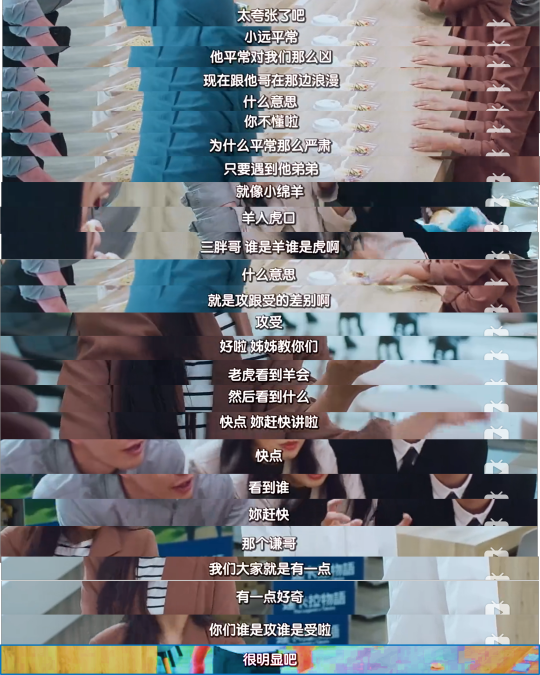
The discussion in the episode starts with Wei Qian’s staff gossiping about his relationship with Wei ZhiYuan. One of the staff members comments that Wei Qian is like a little lamb (小绵羊) when it comes to his little brother:
只要遇到他弟弟
就像小绵羊
Someone replies with the following idiom:
羊入虎口
(Literally: “a sheep enters a tiger's mouth”)
It means to enter a dangerous situation where one will certainly suffer [Source: Wiktionary].
The female employee (who witnessed their kiss) asks San Pang:
三胖哥谁是羊谁是虎啊 - Who is the lamb (羊; sheep) and who is the tiger (虎)?
This has some employees confused and they ask for an explanation. They receive the following reply:
就是攻跟受的差别啊 – [it means] between them, who is gong and who is shou?
One of the staff members repeats the unfamiliar terms:
攻受 – gong shou
and the fu-nu (腐女; fujoshi) offers an explanation:
好啦姊姊教你们 – let this elder sis explain
老虎看到羊会 – the tiger upon seeing the lamb…
Before she can complete her explanation, Wei Qian moves into the scene accompanied by the growl of a big cat. The gossipers disband.
In the end our fu-nu expresses their support for Wei Qian’s relationship with Wei ZhiYuan. Before she runs off, she throws him the question:
你们谁是攻谁是受啦 – between the two of you, who is gong and who is shou?
In the next shot Wei Qian is alone. He flexes his muscles and comments:
很明显吧 - It's obvious, isn't it?
[END OF SCENE]
Everyone at that office seems pretty close. The staff calls Wei “Qian ge” 谦哥 (first name + brother) and not as “Mr. Wei” (as the English subtitles suggests). Looks like Lao Xiong (emphasis on Lao = old) is the only one who clearly disapproves of such gossipmongering.
Notice how the terms gong and shou were translated directly into top and bottom in English subtitles. While that’s technically correct, there’s some nuance missing.
While there are tongzhi (同志;queer) people who use the terms gong and shou, these are not the most popular terms for top and bottom in the tongzhi community. This series specifically uses the terms gong (攻) and shou (受). Why? We’ll get to that in a minute.
In a BL, being shou means that character is the bottom in that particular ship. That character could be top, bottom, versatile or neither in another ship. A character is a bottom (as we use the term in English) only when that character is an absolute shou (sou uke in Japanese). An absolute shou is invariably shou. No matter which ship he becomes part of and no matter who he is paired with, he will be the shou. Similar difference exists between the terms “top” and “gong”.
English subtitles use ‘top’ and ‘bottom’ from the get-go. There is no need to explain what those terms mean. But that’s not the case with gong shou – only 腐 (fu) people (BL fans) really knows what those terms really mean and thus warrants explanation.
Clarification
[Edited. Thank you @abstractelysium and @wen-kexing-apologist for contributing to the conversation.]
As noted in the convo, Wei Qian is pretty ferocious in the office and is only gentle when it comes to Wei ZhiYuan. So, it is normal that gossiping irrespective of topic would end as soon as he arrives. Also, I think Wei Qian didn’t get what gong shou means other than allusion to tiger and lamb. The original language dialogues don’t make it clear that gong and shou means top and bottom (in a ship). [The English subs gives off that impression since gong and shou were simply translated.] Moreover, those terms are danmei literacies that has entered dictionaries but not necessarily public knowledge.
It is like an insider joke for fu-people made possible by Wei Qian’s ignorance. That wouldn’t have worked on Wei ZhiYuan who read danmei while growing up. That wouldn’t have worked if the fu nu (fujoshi) stuck around to explain what that means.
Usually in such conversations in BL, fu-people are shown to be mistaken: they either mess up the ship/dynamic (Love By Chance 1) or the character(s) in the ship deliberately trick them (Counter Attack). It is almost always played out with seme/gong’s approval in BL - not sure if that dynamic between fu-people & seme aka gong character ever appeared in any live-action dynamic. The trigger of this scene is Wei ZhiYuan’s deliberate choice of actions: PDA, kiss in the office right in front of a staff member.
BL literacies
BL is a media genre in itself with different sub-genres, genre conventions and classic works. It sure has a lot of overlap with other genres:
Romance as well as GL – they coevolved. They share mothers and other ancestors.
Queer – Is it really a genre? Even if one were to ignore queer as method in academia, it is still so complex.
Let me quote Taiwanese tongzhi author Chiang-Sheng Kuo:
… what exactly is queer literature? Is it queer literature if queer people like to read it, or is it only queer literature if there are queer characters in the books? Or is it an appendage of the queer movement? If a queer author writes a book without queer characters, does that represent a certain aspect of queer culture?
(You can find the whole interview here.)
Just as danmei (耽美; Chinese BL) has its roots in Japanese BL, so is gong (攻) and shou (受) from seme (攻め) uke (受け).
gong shou aka seme uke dynamics
Mother of BL, Mori Mari, didn’t come up with it, nor did her father Mori Ogai. Both she and her father, among the other dozen tanbi (耽美; same writing as danmei but different readings cause different languages, and different meanings cause different cultures) authors inherited it from authors before them who wrote on contemporaneous and historic Japanese male androphilia.
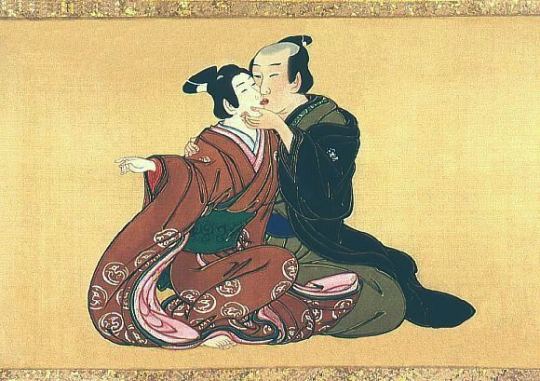
Spring Pastimes. Miyagawa Isshō, c. 1750 | seme uke dynamics in nanshoku pre-dates BL by hundreds of years.
While there is no dearth of riba (versatile) characters in BL, seme uke dynamics is:
a genre specialty. There are similar words in use in GL as well.
an enduring connection to the past of where BL was born.
remnants of a particular model of queerness; an alternative to LGBTQIA+ form of queerness.
What’s there in the scene
There is something hidden in the euphemistic explanation. On the face of it tiger devouring a lamb would be allusion to tiger gong devouring (topping) lamb shou.
But then tiger is a big cat and lamb is a herbivore. Neko (ネコ), the Japanese queer term for “bottom” means cat (etymology is obscure with this one). The term herbivore (草食) when used to describe a man means that man is masculine in a non-hegemonic way. In the series, Wei Qian embodies the hegemonic masculinity while Wei ZhiYuan is a quintessential grass-eater.
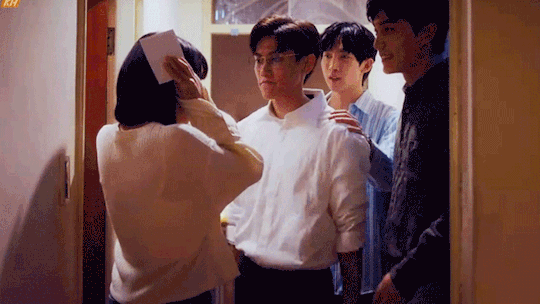
So, the description of lamb being devoured by a tiger would not be associated as simply as with the terms gong and shou especially when it comes from Taiwan which has been historically more connected to Japanese BL than any other BL producers (Sinophone or otherwise).
This connection was highlighted during 魏之远 Wei ZhiYuan's naming scene where Le Ge used the borrowed Japanese possessive particle (の; no).
の = 之 (zhī)
The big cat sound effect for Wei Qian in particular adds to this. Wei Qian’s character is best described as a queen shou.
女王受 Queen shou: A shou who is as proud as a queen, and would devour gong. (source)
Wei Qian and Wei ZhiYuan’s ship is best described by Priest (the author of Da Ge, source novel of Unknown):
经典款毒舌女王和屁颠屁颠的忠犬组合 – paring of a classic, sharp-tongued queen and a tail-wagging loyal dog.
BL literacies & Affective learning
BL kind of has its own language (with words like gong shou), which fans use to share ideas and feelings. This secret language is what academics call ‘literacies.’ BL fans are all in on this and have their own ‘ways of behaving, interacting, valuing, thinking, believing, speaking, and often reading and writing’. Through ‘various visual, conceptual and textual literacies’, BL fans weave ‘an intertextual database of narrative and visual tropes which readers draw upon to interpret BL’. BL literacies is learnt through ‘affective hermeneutics – a set way of gaining knowledge through feelings.’ Audience learn BL literacies from BL works ‘which eventually leads to their active engagement’ with other BL fans. (source; Kristine Michelle L. Santos explains it in the context of Japanese BL but it applies to all BL media irrespective of where it is from.)
That scene in Unknown was set up to familiarize audience with BL literacies – not only those specific words but also the larger practice of imagining character pairing and indulging in that imagination. This is evident from the overall jubilant tone of the scene and the camera work. It is a celebration of moe. That is why we have a character who is not only a fu-nu but also willing to be openly fu-nu in that setting, sharing BL literacies and her colleagues interested to learn.
For other examples, check out Thomas Baudinette’s book Boys Love Media in Thailand: Celebrity, Fans, and Transnational Asian Queer Popular Culture. He has a chapter dedicated to explaining how genre conventions were taught to the early audience of Thai BL through similar scenes.
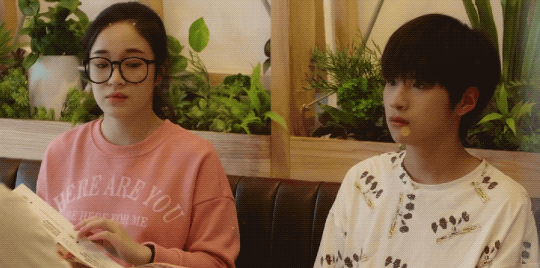
Why must they do this? Why break the fourth wall like this? To get more people interested in the intricacies of BL and to get them to participate in the culture. BL is created by fu-people and BL literacies are their tools and source of joy. BL must draw in more people to keep BL culture going. Commercialized BL we have today is the result of an affective culture formed over the years. It is built on years of labor of authors and their audience. I mean, look at the Unknown. This BL employs the well-developed Loyal Dog gong x Queen shou dynamics. Apart from that which the series took from the novel, it also drew upon other common BL beats to tease the relationship between Dr. Lin and his senior.
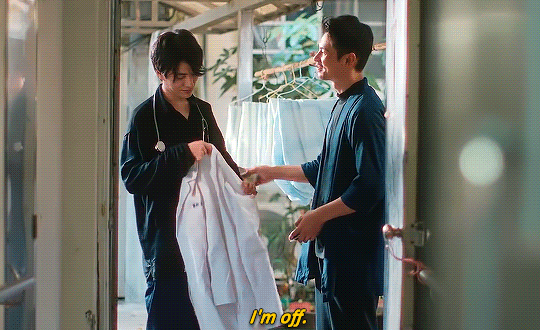
Teaching BL literacies is political. When Mainland Chinese government gets dangai productions to change names and relationships of characters (among other things), it is to prevent live-action audience from discovering BL as a genre with it disruptive potential. It is not only character's names and relationships that are changed. There are entire sub-genres of danmei (such as 高干) that got wiped out by censorship.
When a Taiwanese BL not only retains the character names & relationships and shows relatively explicit intimate scenes but also actively promotes BL literacies, it is an act of resistance. Discussion of gong shou, being genre specialty, manages to do so. Interestingly, they are doing it in an adaptation of a novel by Priest who has a particular reputation with self-censorship. That scene is not part of the source novel.
Heterosexual & gong shou
Association of bottom with the feminine (female or otherwise) has its roots in medicalization (and pathologization) of homosexuality in the west (such as through theories by scientists and doctors like Richard von Krafft-Ebing). This “knowledge” subsequently spread across the globe and was adopted to varying degrees and forms.
Moreover, the terms gong and shou applies to heterosexual pairing too.
BG (boy girl) ships have male gong and female shou
GB (girl boy) ships have female gong and male shou. [If this is interesting unfamiliar territory, check out the series Dong Lan Xue (2023).]
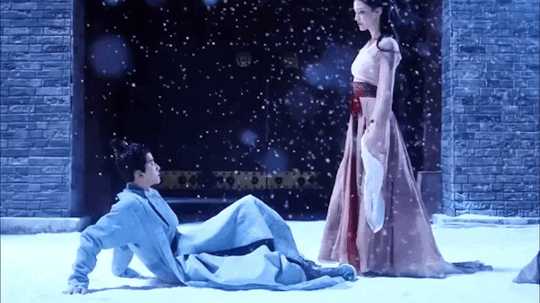
Moreover, if one is willing to look beyond LGBTQIA+ form of queerness (which is born and brought up in America), one can see other queer possibilities. For example, Kothi-Panthi queerness in South Asia which is characterized by explicit presentation of top bottom dynamics. There are very many similar forms of queerness in other parts of Global South.
In many cultures, sexuality doesn’t inform identity but sexual preference does. That’s why is you are to ask a kothi-panthi couple which one of you is the bottom, the kothi would tell you without hesitation: “I am.” Might even asked you in turn, “Couldn’t you tell?” For them, sexual preference (being kothi) rather than sexual orientation takes center stage. This is the inverse of how LGBTQIA+ form of queerness looks at it. While LGBTQIA+ model of queerness focuses on sexual orientation (being pan, ace, gay, etc.) as something that can be freely discussed but sexual preference (top, bottom, versatile, side, etc.) is considered private.
*Just to be clear, “kothi” is a term of self-identification. It means that the person is a bottom. Panthi is not self-identification. That’s how kothi address the men who top them.
While thanks to westernization LGBTQIA+ form of queerness enjoys more visibility, I think it is better to consider it as one type of queerness rather than the only model of queerness. Gong shou dynamics doesn’t fit into LGBTQIA+ form of queerness because it comes from another, much-older nanshoku model of queerness that made its way into Japan from China, hundreds of years ago.
Friction between different models of queerness is common where ever they interact. In 1970s, Japan was witness to public debates between a younger, westernized Japanese queer activist Itō Satoru and other Japanese queer activists such as Fushimi Noriaki and Tōgō Ken who were rooted in indigenous tradition of male-male sexuality.
[Itō Satoru’s] insistence on the necessity of adopting western models of gay identity and coming out have brought him into conflict with other activists such as Fushimi Noriaki and veteran campaigner Tōgō Ken.
Interpretation and Orientalism: Outing Japan's Sexual Minorities to the English-Speaking World by Mark McLelland
Clarification
[Edited. Thank you @wen-kexing-apologist for contributing to the conversation.]
Under the LGBTQ+ model of queerness, it maybe considered inappropriate to have conversation about “top” “bottom”, especially in the office, going as far as to ask that to Qian ge. From that perspective, the BL audience (especially those who are unfamiliar with the terms gong and shou) are fair in their assessment of that scene being out of place or outright offensive.
I think things might have been a bit different if the subtitles retained the terms gong shou instead of “top” “bottom” since they aren’t exactly the same thing. That would have had the desired effect (of introducing BL literacies - gong shou in the context of 强强 (strong gong x strong shou) pairing) without unintended consequence.
What is considered rude under the LGBTQ+ framework is an essential part of fu culture. It is like addressing Wei Qian as just Qian – that could be considered rude in the original language but pretty normal in English. Different cultures, different norms, so to speak. It is only polite to be mindful of the cultural differences and avoid discussing about sexual preference where it is considered inappropriate.
As for the normalization of fu culture (especially discussions of gong shou), in my opinion the didactic scope of Unknown is undermined by the very fact that it is primarily a gǔkē danmei (via adoption (收养)) with tongyangxi vibes (highlighted multiple times by San Pang in the novel) associated with Wei ZhiYuan.
Somehow fu-culture gets judged by those who consume products of that culture. Everyone is happy with fu-cultural products as long as fu-people don't discuss who is gong and who is shou.
Why are fu-culture and BL always judged based on a culturally alien lgbtq+ form of queerness? Why must BL be arm-twisted to fit into norms of lgbtq+ form of queerness just because that is the most mainstream form of queerness?
-
That’s not much a conclusion but this is already so long. I really hope it gives you something to think about.
If you are interested, here's more.
#boys love#danmei#taiwanese bl#bl meta#bl history#bl analysis#unknown the series#unknown the series analysis#unknown the series meta#unknown#priest novels#unknown bl#unknown series#unknown the series spoilers#taiwanese series#taiwanese drama#chinese bl#chinese queer culture#danmei tropes#danmei novels#bl tropes#bl trivia#bl taiwan#unknown bl meta#unknown bl analysis#bl critique#bl novel#bl drama#yuan x qian#zhiyuan x qian
170 notes
·
View notes
Text
my danmei fanfic pet peeve is when xianxia modesty standards are referred to as “victorian.” queen victoria wasn’t just over there chilling in ancient fantasy china. there has to be other words out there for prudishness that don’t have the connotation of 1800s european culture.
#danmei#svsss#mdzs#this is pretty prevalent in scum villain fandom but i’ve seen it in transmigration fics for other fandoms as well#like idk using a word so steeped in western hemisphere meanings to describe chinese culture feels wrong#like you realize’victorian’ means queen victoria. of england
121 notes
·
View notes
Note
Hi I just wanted to say I absolutely love your fic The Untold Tale so far. The way our favorite emperor is already obsessed with our favorite oblivious idiot is just perfection. You’re an incredible writing and all your fics are amazing. I can’t wait to see what you write next!
This is in reference to The Untold Tale (AO3 🔗).

Thank you very much for reading, anon! 🫶 I’m very happy there are still readers who are waiting for the next update and I’m very excited to return after I finish writing Truce ch3. 🥰 Honestly, after reading the Bingge vs Bingmei extra after SVSSS, my heart broke reading the passage where Bingge entreats Shen Qingqiu (Shen Yuan) to come with him and obviously gets rejected because Luo Binghe (Bingmei) won’t have his husband bride-napped even if it’s the PIDW version of himself and wanted to try my hand at writing a bingyuan story where our blackened Luo Binghe does get a version of Shen Yuan that’s tailor-made just for him. It also presented me an excuse to play around with a C-novel style of writing and granted me a small opportunity to write about my culture :) which is very rare for a writer. And I love it 💞 we also get to play with C-novel & C-drama stereotypes that I can playfully poke fun at and hope y’all find as subtly funny as I do . Playing with meta is very much aligned with the spirit of SVSSS, and this story was always intended to be a love letter to the novel series that got me through the pandemic and introduced me to the danmei genre.
I’m very excited when we return! I’ve got a lotta fun things planned. :) For the next chapter, we’re meeting the Jade Emperor. With SY being a celestial fortuneteller, we’re also meeting Shen Yuan’s PIDW equivalent family. After that chapter is the Moshang introduction chapter I’m most excited about because it’s the reveal of ✈️’s identity (and my illustration of him embedded in the chapter itself). It’s technically been foreshadowed already who he might be but you will never be able to guess who Airplane Shooting Towards the Sky transmigrated into in this new setting in PIDW in The Untold Tale. ✈️ can only blame his fellow novelist SY for this. He’s both lucky and unlucky. 😔😂


#ask#svsss#scum villain#bingyuan#luo binghe#shen yuan#scum villian self saving system#phoenix talks#anon#anon ask#ty for the ask!#this fic is probably the prettiest my writing has ever been#full of metaphors and allusions and meta refs (plus some Chinese cultural lessons)#it also gives me an excuse to write my fav ship (bingyuan) that’s not bingqiu & a chance to write moshang#we’re very much poking fun (affectionate) at the danmei & cultivation & palace intrigue genres
35 notes
·
View notes
Text
AMAZING RESOURCE for ancient Chinese ranks & titles!!!! Everyone say thank you NYANOVELS!
#reference#misfitrefs#resource#fanfic#fic#writing#svsss#writing reference#wuxia#xianxia#ancient china#titles#ranks#honorifics#china#chinese#ancient chinese ranks#ancient chinese culture#chinese culture#culture#chinese society culture#chinese society#help writing ancient china#help writing wuxia#danmei#writing danmei#mo xiang tong xiu#mxtx#mxtx novels#ren zha fanpai zijiu xitong
22 notes
·
View notes
Text
Men are all for freedom of speech until you start talking about Wangxian in the Republican discord server, then it's all "I thought I muted her" and "you've lost your photo privileges" fucking hypocrites
#proship#republicans#the untamed#lan wangji#mdzs#mo dao zu shi#lan zhan#wei wuxian#freedom of speech#first amendment#freedom of expression#the democrats server kicked me out#danmei#traditional chinese culture#chinese culture
25 notes
·
View notes
Note
i read the way spring arrives on ur rec, and loved it so much!! i ended up rly appreciating the nonfiction essays the most, they provide such valuable context for the genre (xueting christine ni's essay abt female web novel authorship was incredible!) highly agree with ur point abt it being essential reading for danmei (esp western) readers. so thank u for making me aware of it!
oh oh oh!!! so glad that I could bring this book to your attention and that you got so much out of it!
I feel like I should clarify that The Way Spring Arrives and Other Stories doesn't contain danmei, nor is it about danmei; rather, I think it is important and necessary reading because it provides a great deal of the context for the literary and cultural environment that danmei is contained within. through the translated short stories, you can experience such a wide range of literary imagination, from Xia Jia's experimentation co-writing with an AI to the haunting, fable-like atmosphere of "The Woman Carrying a Corpse" by Chi Hui to vicious devastation of "Dragonslaying" by Shen Yingying to the fantastic, dreamscape world of "The Way Spring Arrives" by Wang Nuonuo... and the essays examine translation from various perspectives (Emily Xueni Jin's "Is There Such a Thing as Feminine Quietness? A Cognitive Linguistics Perspective" and Yilin Wang's "Translation as Retelling..." and R. F. Kuang's "Writing and Translation: A Hundred Technical Tricks") while incorporating theory and context into discussions of speculative literature written by women and nonbinary authors in China
the increasing international attention paid to danmei over the past few years often operates in a vacuum: beyond the language itself, most international readers have no concept of the history, the culture, the literal context of the literary landscape. what is internet literature, and how does it differ from traditional publishing? what are the dynamics of social expectations, gender, and tradition that influence and inform what authors write about? what are the wounds and fears, exploration and experimentation, heartbreak and history woman writers (and beyond) engage with in contemporary Chinese literature, and how are they mediated through genre?
all of which is to say, The Way Spring Arrives and Other Stories is a great place to start learning more
#not to be like 'DIVERSIFY YOUR UNDERSTANDING OF CHINESE LITERATURE BEFORE MAKING MORAL PRONOUNCEMENTS ON DANMEI' but like. do that#hunxi book tag#I understand why people's engagement with Chinese culture would begin with cdramas and end with reading translated danmei#but I hope no one's taking that as a comprehensive understanding of Chinese culture#because it's such a wild and wondrous and scary and vast place to discover#and I'd hate for people to look away before they even get to the good stuff
124 notes
·
View notes
Text
Just looked at the glossary, pronunciation guide, and terminology sections of 7seas tgcf and y’all were right, this shit is mad offensive lmao. (Not to say that I didn’t believe folks before, I’d just always skipped everything after the actual story content for the other mxtx books.)
#just copped a volume and everyone involved in this is going to hell#i can only laugh at this point#what made them think THIS was ok????#on top of which my volume is a later one#why are certain concepts being explained over and over again#who is the target audience and why do y’all assume we have goldfish memory when it comes to Chinese culture???#you think english-speaking danmei fans can’t understand a handful of terms common in the danmei genre???#common in the 2000-page book you’re currently translating???#they should’ve stopped at explaining the names ONCE and explaining the terminology ONCE as it popped up#but the pronunciation guide? 😬
93 notes
·
View notes
Text
currently reading how to survive as a villain and I managed to find a main character more stressful than shen qingqiu bruh don't think about the harem of the protagonist he's clearly GAY FOR YOU
#danmei#how to survive as a villain#transmigration#xiao yu an#yan he qing#slow burn#pining#mlm#historical#political#books#chinese culture#the main character is stressful
10 notes
·
View notes
Text
i was thinking of translating some reviews like this one because i'm very much procrastinating on life but every time i read what i wrote i'm like, how the hell are you supposed to translate even a single word.
#fate's stuff#chinese language#i might do it#but gosh it is so fricking hard#where to start#the culture#it's funny how much culture influences languages and thoughts#encountering a snake#遇蛇#yu she#chinese#danmei
6 notes
·
View notes
Text
BL: Romancing in a Bubble?
As always, please let me know if you have suggestions, critiques, comments or corrections.
I will only be discussing BL broadly (here I use BL as an umbrella term) and not just live action. I don’t want to club together BL and GL since in spite of their shared roots they are very different in their genre conventions, target demographics, and history. Also, I am not very familiar with it.
youtube
I consider BL a genre in itself – practically well as the way Masala is a cinema genre.
Please check the content/trigger warnings before diving into the works I have mentioned below. Feel free to message or ask.
BL / romance
I don’t think BL is romance or even a sub-genre of romance. A lot of BL is romance. Many more of them have at least a romantic side to them. There is enough overlap between those genres to give the impression that BL is romance. (I remember the discussion Killing Stalking had prompted.)
But there are plenty of BL devoid of romance. Like One Room Angel, Social Reform Season, and The Orc Bride. Similarly, BL is not exactly a porn sub-genre even though there are plenty of ero-BL.
Also, there are plenty of BL where romance takes backseat such as The Night Beyond the Tricornered Window, Blue Morning, Brother, Lawless Gangster and Thousand Autumns.
BL / queer
Queer – Can I call it a genre the way I call BL a genre? Even if one were to ignore queer as method in academia, it is still so complex.
Let me quote Taiwanese tongzhi (queer) author Chiang-Sheng Kuo:
[W]hat exactly is queer literature? Is it queer literature if queer people like to read it, or is it only queer literature if there are queer characters in the books? Or is it an appendage of the queer movement? If a queer author writes a book without queer characters, does that represent a certain aspect of queer culture?
(You can find the whole interview here.)
I think the problem persist even when I think of queer as a label.
Then there is the issue with conception of “queerness” itself. Like, in a way it is a limiting term. Is it fair to call normative or customary male-male erotic practices such as masti and Launda Naach, “queer” just because that’s how it is perceived elsewhere now?
To quote what Kaustav Bakshi wrote in Writing the LGBTIHQ+ movement in Bangla:
In the last decade, the question of decolonizing queer epistemologies was being raised periodically, whereby queer politics, despite having a shared agenda of toppling heteronormativity, and queer culture, albeit having a shared aesthetics, became more and more regionalist – not in a negative sense – but, with implications of difference, which can be interpreted and understood only when one subjectively experiences the ‘region’ with respect to gender, class, caste, ethnicity, physical and intellectual ability, access to education, metropolitan cultures, and most importantly, the internet.
[T]he attraction towards the launda is not understood as ‘queer’ – non-normative or out of the ordinary – but, as an integral part of sexual life, which is not always compulsively alert to the heterosexual-homosexual binary.
Imo, decolonizing queer epistemologies comes in handy when discussing BL since there are plenty of BL dealing with:
Historical BL set in eras and locations that had customary male-male sexualities and practices.
BL with special settings, like omegaverse, with different (if any) idea of queerness.
BL / other queer content
Just as Japan has gei-comi, and other manga like Shoujo Manga Artist Minamoto-San Comes Out, and Kieta Hatsukoi (shoujo), What Did You Eat Yesterday and My Brother's Husband (seinen) beside BL manga, different countries offer diversity in queer content with noticeable overlap. But clubbing them together would not be easy. Moreover, this diversity is as much cross-sectional as it is temporal (tanbi, JUNE, shonen ai, yaoi, BL in Japan).
BL the main difference between BL and other queer genres is BL’s focus on moe (affect). Anyway, BL predates LGBTQ+ acronym. It predates de-pathologization of homosexuality in many BL creating regions. Fu-people (BL fans) were creating BL before mainstream media started representing queer people in media. Fu-people battled state and its censors everywhere along with queer people. Live action BL is commercialized and we get mostly feel-good content. But that is capitalism (and the State) reaping the dividends of decades of fu-people’s labor of love.
I wonder if it is apt to consider BL the way western queer shows (such Verbotene Liebe, Queer as Folks, Os Nossos Dias and SKAM) as benchmark when discussing BL? Won’t it be better to evaluate consider BL in relation to local non-BL queer content in BL producing countries? But then, there are BL inspired by western queer culture such as Partners by Tamaki Yura.
Here are three gei-comi that I recommend for BL audience, through which they can get an insight into non-BL queer manga from Japan (created with androphilic men as target audience) :
Fire Code by Ichikawa Kazuhide
Fisherman's Lodge by Gengoroh Tagame
Coming Home by Go Fujimoto
Here is my BL versus gei-comi list which I think highlights their differences and similarities (I have included only Gengoroh Tagame’s works since they are probably the easiest to access/buy/borrow):
Do You Remember South Island P.O.W. Camp? by Gengoroh Tagame || Hitori de Yoru wa Koerarenai by Matsumoto Yoh
Arena by Gengoroh Tagame || Jinx by Mingwa
Cretian Cow by Gengoroh Tagame || The Orc Bride by Madobuchiya (Nishin)
Uo to Mizu by Gengoroh Tagame || Terpenoid by Okadaya Tetuzoh
My Brother's Husband by Gengoroh Tagame || The Story of My Brother by Ike Reibun
There is lot of overlap between BL and gei-comi. Gengoroh Tagame first published in JUNE (a magazine that contributed to BL we know now). There are magazines and anthologies (Nikutaiha BL) that offer crossover between different streams of queer content.
Similarly, there are danmei (Chinese BL) novel written by queer men such as the autobiographical works: Six Records of a Floating Life and Waiting Until 35 Years Old by NanKang BaiQi and Bei Cheng Tian Jie (北城天街) by FeiTian YeXiang.
BL / Queerness - exploration and conflict
Here are some live action BL (I’m not including some of the more famous ones like TharnType and Wedding Plan) where plot is rooted in character’s queerness and its exploration or implications:
Lan Yu – first danmei to get live action adaptation. The central conflict is rooted in the queerness of its characters, particularly Chen HanDong.
A Round Trip to Love and Irresistible Love – based on danmei by Lan Lin. These are part of a shared universe. The former has both ‘coming out’ (Cheng Yichen) and ‘leaving home’ (Lu Feng).
In the latter, all the conflict is rooted in compulsory heterosexuality and we get the perspective of not only an amphiphilic (bisexual) man (Xie Yan) but also an amphiphilic woman (Xia Jun) of the same social class.
Boys Love: The Movie
No Touching At All (2014)
Udagawachou de Matteteyo (2015)
The Cornered Mouse Dreams of Cheese
Sing in Love (2022) – Queerness is part of the main conflict.
Mood Indigo
Life: Senjou no Bokura
Light on Me
I don’t keep track of these things usually, so this is based off memory.
In Japan, most BL has dealt with the struggles of being queer in a largely heterosexist society since the days of tanbi and shonen-ai (such as Zankoku Na Kami Ga Shihai Suru by Hagio Moto). JUNE gained notoriety for focusing on it and yaoi boom was movement away from that. Then yaoi gained notoriety for existing in a bubble. When BL started to treat heterosexism in society as a part of the narrative, it garnered praise for being ‘transformative’.
BL has managed to carry within it different modes of identity and queerness.
Take Okane ga Nai (No Money) by Hitoyo Shinozaki and Toru Kousaka for example.
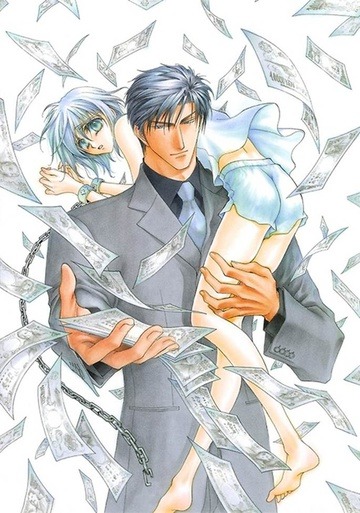


It is often held up as the epitome of all that is wrong with BL (or yaoi as anglophone fandom calls it). What’s less talked about is the main character, Ayase Yukiya’s queer angst and his exploration of identity that spans several volumes of the manga series. Kano on the other hand doesn’t struggle with his identity at all since his attraction to Ayase is driven by a very strong, initially unreciprocated emotional connection dependency (formed when his father died and he was at his lowest). For him, sexuality is merely a form of expression of his attraction for Ayase. Therefore, it does not inform his identity in anyway.
Within cannon, Someya and Honda’s pairing offer contrast to Ayase and Kano’s pairing. In a way, Kano and Someya have post-queer and pre-queer identities, respectively. Someya is a self-actualized person who mentors other queer characters (club staff, Ayase, Honda, Kano). There is a lot of give and take that happens between Ayase and all the queer people he meets at Someya’s club. Ayase's and Honda’s struggles with identity and sexuality are juxtaposed with Kano's and Someya's self-assured disposition.
That is also why I don’t think I Told Sunset About You stands out much. It can easily fit into the BL fold because there are plenty of BL that approached the same theme as I Told Sunset About You in a similar fashion (including these live action BL: His - Koisuru Tsumori Nante Nakatta, Life: Senjou no Bokura and The Cornered Mouse Dreams of Cheese).
I recommend the danmei novel Sissy by Shui QianCheng, the author of the works Beloved Enemy, My Stand-In and Meet You at the Blossom are based on, for a more detailed exploration of heterosexism, including femmephobia and homophobia.
Sissy, Beloved Enemy and Professional Body Double (the novel My Stand-in is based on) are all part of 188 group (a shared universe of novels).
There are plenty of other BL from other region that are focus on themes such as heterosexism and compulsory heterosexuality. Here is such a one-shot: Romantic by Motoni Modoru (part of the anthology Tanbishugi).
BL / terms
I like BL and associated terms like danmei because of the culture and the history associated with those terms. Tanbi and danmei are different readings of same characters 耽美 but they represent very different things. Shonen-ai literally translate to boy(s) love but that term (or BRM (boys’ romantic manga) as Emiko Nozawa puts it) carries within it so much history and specific artistic styles and sensibilities. Waai is derived from yaoi/yuri but there are fu-cultural processes, very different from that of yaoi creation, behind the production of Y-novels. I learned a lot from exploring these words alone.
#japanese bl#korean bl#thai bl#bl meta#ql meta#homophobia#heterosexism#queer#queer media#queer culture#gei-comi#gei comi#bl recommendation#danmei#188 group#188男团#bl analysis#asian ql#ql dramas#I Told Sunset About You#itsay#no money#Okane ga Nai#multiple works mentioned#chinese bl
24 notes
·
View notes
Text
I've fought against it needlessly for years but with each day I grow closer and closer to reading The Untamed just so I can understand the cameos in SVSSS fanfic
#sigh. how many novels we talking here?#why I didn't get into it two years ago when it was big: I didn't know anything about Chinese culture or danmei and it looked intimidating#I still don't know much about Chinese culture but I'm almost too curious to care#and lord knows my interest in SVSSS only got deeper with time so...idk
2 notes
·
View notes
Text
can anyone rec a good bilingual (eng / simplified cn + pinyin, for preference) edition of the shijing? i would accept an eng-only edition if you REALLY, REALLY like the translation, but i'd prefer if i don't have to do the flipping-constantly-between-two-books shenanigan :/
#the trashcan speaks#its genuinely hilarious that the danmei hyperfixation part of my brain has metastasized into#like. giving me the Good Hyperfixation Juice from LITERALLY ANYTHING related to chinese history/culture/language#rn i am also impulse buying romance of the three kingdoms so i can have blorbo brainrot abt it#accidentally becoming More Cultured and reading the Literary Canon by way of SCUM VILLAIN
3 notes
·
View notes
Text
me pretending that jiu no kuchizuke is an original sid song because i refuse to believe that it was an opening song for a fucking danmei anime adaptation.
#🍡 ;; shut up vanie#i am number one danmei hater. if there is one hater of danmei that one is me#if there is no hater of danmei that means im dead#i fucking hate danmei sudden hype so much#because as a chinese. im still bitter whenever i remember back when people mocking chinese culture with racism and sinophobic jokes#and it was considered as cool and trendy to mock chinese people and their culture#that until hoyo and danmei existed. then suddenly people turn 180 to chinese and now starting to like chinese media???#like aren't you used to hate chinese people. why tf you fuckers suddenly went bent over backwards
0 notes
Text
It's very easy to project myself onto Ratohnhaké:ton, actually. BIPOC, won't take white people's shit, and dedicated to his people. But like. It is difficult to come up with headcanons for him sometimes because there are cultural nuances that I don't understand. Kanien'kehá:ka people get the last word on it.
#idk what this is i'm just thinking a lot again about how we project our own cultural values and identities onto characters#but sometimes our headcanons and thoughts can be...misguided#again this comes from my experience in danmei right#a lot of people have interpretations of characters where the vibe is a bit ehhhh#because they don't understand chinese culture#and they accidentally put western values on it#idk it goes back to how i love ratohnhaketon but i feel weird about the headcanons i come up with sometimes#because there's such a larger lack of understanding of his culture#tears falling like peridots
0 notes